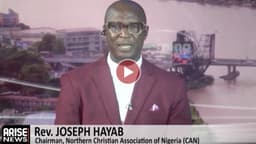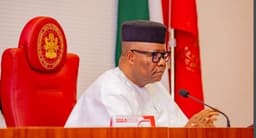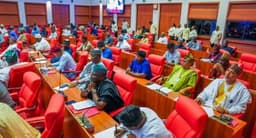


























NEWS EXPRESS is Nigeria’s leading online newspaper. Published by Africa’s international award-winning journalist, Mr. Isaac Umunna, NEWS EXPRESS is Nigeria’s first truly professional online daily newspaper. It is published from Lagos, Nigeria’s economic and media hub, and has a provision for occasional special print editions. Thanks to our vast network of sources and dedicated team of professional journalists and contributors spread across Nigeria and overseas, NEWS EXPRESS has become synonymous with newsbreaks and exclusive stories from around the world.
.webp&w=1200&q=75)
Bello Tukur, a Fellow of the Institute of Chartered Shipbrokers (ICS) and Vice Chairman of its Nigerian Chapter, has built his career in the commercial shipping industry where he currently works with River Lake Shipping, a firm involved in tanker, dry bulk, and offshore services. In this interview with selected newsmen, he speaks on the role of shipbrokers in global trade, the opportunities and challenges in Nigeria’s maritime industry. TOLA ADENUBI brings the excerpts.
MANY people may not be familiar with the work of a shipbroker. How would you describe the profession and its relevance?
A shipbroker is essentially an intermediary who connects charterers with ship owners. We facilitate transactions—whether it is the sale and purchase of vessels, arranging chartering for tankers and bulk carriers, or providing offshore support services. Globally, shipbroking is a critical pillar of commercial shipping because it ensures that cargo and vessels meet efficiently in the marketplace.
The Institute of Chartered Shipbrokers has been around for more than a century. What role has it played in shaping global maritime education?
The Institute has set the standard for commercial shipping education worldwide. For over 100 years, it has provided structured learning for professionals, and its members today are spread across major shipping lines, oil companies, and global commodity houses. For newcomers, the Institute offers a range of subjects that can be tailored to individual interests—whether in chartering, operations, or shipping law. It gives aspiring professionals a solid springboard into a global career in maritime commerce.
Let’s talk about Nigeria. From your perspective, what are the major issues confronting the Nigerian maritime sector today?
The most glaring challenge is infrastructure. Our ports were originally designed for about 50 million metric tonnes of cargo, yet they are handling over 100 million tonnes. That overstretches facilities and slows down cargo clearance. The new deep-sea ports with automated cargo handling are easing some of this pressure, but we still record delays in certain terminals. Security has improved, but insurance premiums remain high, and Nigeria has not yet been removed from the global piracy list. Beyond that, regulatory inconsistencies and overlapping agencies often complicate operations. The high cost of logistics—23% of GDP compared to a global average of 12%—is also a drag on competitiveness. The ICS contributes by developing skilled professionals who can help manage these issues more efficiently and by promoting best practices across the industry.
How can shipbroking support Nigeria’s participation in the African Continental Free Trade Agreement?
Nigeria currently has fewer than 40 qualified shipbrokers, and many unqualified individuals are filling the gap. This limits our ability to influence and expand intra-African trade. Take liner services, for example—shipping goods to Europe is often cheaper than moving them to a nearby African port, like Abidjan. That happens because of poor scheduling, irregular services, and limited capacity. With proper shipbroking structures, we can pool investments, set up coastal shipping services, arrange voyage or time charters, and build regional trade corridors. If done right, goods will no longer need to pass through Europe or Asia before reaching African destinations.
The government has introduced the Marine and Blue Economy Policy. Do you think it can transform the sector?
It is a commendable policy. It seeks to unlock the potential of our oceans by improving port efficiency, encouraging aquaculture, promoting shipbuilding, and investing in marine renewable energy. The target is to grow the maritime sector’s contribution to GDP from less than 1% to over 6% by 2030, in line with the UN Sustainable Development Goals. However, the policy leaves out port and coastal clusters, which could help regions specialise, create jobs, and fully exploit marine potentials. To succeed, implementation must be backed by strong public-private partnerships. Only then will it move from being a good plan to an excellent outcome.
How do you see shipbroking evolving in Nigeria in the years ahead?
Globally, shipbroking is a billion-dollar business. In Nigeria, it is still developing, but it holds promise as a driver of local participation. Many indigenous operators depend on waivers because they can’t afford specialized vessels. Shipbroking offers an alternative through chartering. While NIMASA’s attempt to involve banks in vessel financing is laudable, many locals still can’t meet the requirements. Shipbroking can bridge these gaps by standardizing agreements, easing access to vessels, and building technical expertise. It is a tool that can significantly boost indigenous presence in tanker, bulk, and offshore markets.
Beyond NIMASA’s policies, what regulatory changes would you like to see?
The key issue is fragmentation. For instance, waivers are not issued by NIMASA but by the Ministry, when there is no local capacity. Instead of making waivers the default option, regulators should insist on chartering first. There is no vessel—whether rigs, offshore craft, or cargo ships—that cannot be accessed through time or voyage chartering. Making chartering compulsory before granting waivers will encourage local operators to build capacity sustainably.
What are your thoughts on how the government can grow maritime revenue?
The government must commit to full implementation of the Marine and Blue Economy Policy. This includes stronger regulation, proper monitoring of both public and private players, and a clear focus on capacity building. If this is done, Nigeria’s maritime sector could increase its GDP contribution to between 7–10% by 2030. That growth will translate into new jobs, industrial expansion, and greater export capacity.
What opportunities does the Institute of Chartered Shipbrokers provide for capacity building in Nigeria?
We run three main programmes: Professional Qualifying Examinations (PQE): Covering Diploma and Advanced Diploma stages. The other one is Dissertation Route, which is a two-year programme for seasoned professionals who want to become full members. Then there is Certificate and Short Courses: Such as “Understanding Shipping,” CPD programmes, and customized training for companies. We also admit students as members, giving them access to international-standard exams and resources that prepare them for careers in commercial shipping.
How does ICS link Nigerian shipbrokers to global best practices?
Our headquarters in London connects us to the global hub of shipping. We collaborate with BIMCO, the IMO, the Baltic Exchange, and the World Maritime University. Our training modules are aligned with international trade standards. We are also working to deepen partnerships with Nigerian universities—over 20 of them already run maritime programmes. Through exchange programmes and hands-on training, we hope to expose students to the realities of the global maritime marketplace.
The Cabotage Vessel Financing Fund has been a subject of debate. Why has it been so difficult to disburse, and what is your advice to the government?
The truth is that, unless shipping development becomes a true priority, the CVFF will never achieve its purpose. A framework has now been developed to guide disbursement, but the challenge lies in ensuring transparency and proper targeting. The fund must be released to operators with proven expertise, entrepreneurial ability, and genuine involvement in shipping—not just politically-connected individuals. Only then can it serve its purpose of building indigenous fleet capacity and contributing to the growth of the blue economy. (TRIBUNE)